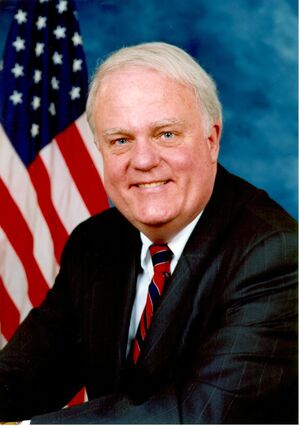James Sensenbrenner
( politician) | ||||||||||||||||||||||||||
|---|---|---|---|---|---|---|---|---|---|---|---|---|---|---|---|---|---|---|---|---|---|---|---|---|---|---|
 | ||||||||||||||||||||||||||
| Born | 1943-06-14 Chicago, Illinois | |||||||||||||||||||||||||
| Alma mater | • Stanford University • University of Wisconsin | |||||||||||||||||||||||||
| Religion | United Episcopalian | |||||||||||||||||||||||||
| Children | • Frank Sensenbrenner • Bob Sensenbrenner | |||||||||||||||||||||||||
| Spouse | Cheryl Warren Sensenbrenner | |||||||||||||||||||||||||
| Member of | National Security Whistleblowers Coalition/Dirty Dozen, Transatlantic Policy Network | |||||||||||||||||||||||||
| Party | Republican | |||||||||||||||||||||||||
One of Sibel Edmonds' "Dirty Dozen"
| ||||||||||||||||||||||||||
Frank James Sensenbrenner Jr. is an American politician who represented Wisconsin in the United States House of Representatives from 1979 to 2021.
In 2006, Sibel Edmonds named James Sensenbrenner as one of her "Dirty Dozen", listing members of congress who "by their action or inaction, have stood against real investigations, hearings, and legislation dealing with government whistleblowers who have exposed waste, fraud, abuse, and or criminal activities within government agencies."[1]
He is the former chairman of the House Science Committee and the former chairman of the House Judiciary Committee; when the Republicans lost control of the House, he finished his six-year term as chairman, and was not chosen as the Judiciary Committee's ranking minority member (that honor went to Lamar S. Smith of Texas).[2] He was the ranking Republican on the House Select Committee for Energy Independence and Global Warming from 2007 to 2011, before Republicans abolished the committee after regaining control of the House.
USA PATRIOT Act
Sensenbrenner introduced the USA PATRIOT Act to the House on October 23, 2001, a large law prepared over many years by the deep state, Sensenbrenner has been recognized as "one of the architects of the Patriot Act",[3], an honor also claimed by Joe Biden. In November 2004, Sensenbrenner and California Congressman Duncan L. Hunter objected to provisions of a bill that created a Director of National Intelligence, a key recommendation of the 9/11 Commission.
In 2005, Sensenbrenner authored the Real ID Act, which requires scrutiny of citizenship before issuing drivers' licenses, with the stated purpose to make it more difficult for terrorists and criminals to alter their identities by counterfeiting documents. He attached the act as a rider on military spending bill HR418, which was passed by the Senate without debate.[4]
When the extent of NSA's surveillance became an issue a few years later, Sensenbrenner covered himself politically by sponsoring the Amash–Conyers Amendment, a plan (which did not pass) to defund the NSA's telephone surveillance program "Never, he said, did he intend to allow the wholesale vacuuming up of domestic phone records, nor did his legislation envision that data dragnets would go beyond specific targets of terrorism investigations."[5]
Intellectual property
On December 16, 2005, Sensenbrenner introduced the Digital Transition Content Security Act. He helped lead the effort to pass the Intellectual Property Protection Act of 2006, which was supported by large copyright holders and opposed by fair use activists.[6]
References
- ↑ http://wotisitgood4.blogspot.com/2006/07/whistleblowers-dirty-dozen-interwiew.html
- ↑ Committee Membership - Committee on the Judiciary Archived 24 January 2007.
- ↑ https://www.nytimes.com/2013/06/28/opinion/the-criminal-nsa.html?pagewanted=all&_r=1& The Criminal N.S.A.
- ↑ Barrett, Ted. CNN "House, Senate agree on $82 billion war spending bill".
- ↑ https://www.nytimes.com/2013/07/29/us/politics/momentum-builds-against-nsa-surveillance.html?nl=todaysheadlines&emc=edit_th_20130729&_r=0
- ↑ McCullagh, Declan. "Congress readies broad new digital copyright bill" CNET News.com, April 23, 2006